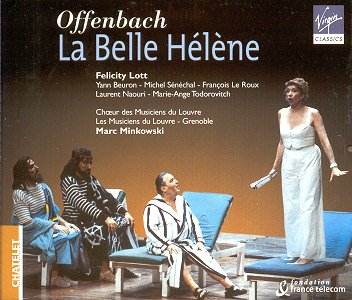Offenbach's popularity in Paris centred particularly
on his witty, brilliant satires on classical subjects. The music has
an irrepressible gaiety and melodiousness allied to a pointed wit. Ruling
over his own theatre, the Bouffes-Parisiens, he wrote for relatively
small forces rather than the larger ensemble found at the Opéra,
but he did not object if circumstances allowed for the opportunity for
more ambition.
What makes this new recording of La belle Hélène
interesting, then, is that it has a sharpness and directness which bear
the mark of authenticity. Minkowski is a specialist in this repertoire
and the whole performance benefits from his understanding of the issues
involved. The whole experience benefits from the clarity of texture
and dynamic; the singers can always be heard and the instrumental lines
are nicely pointed too.
Another strength of this recording is how dramatic
it feels. This no doubt relates to an acclaimed production which was
staged at the Châtelet in Paris during the autumn of 2000 (which
was filmed and can, it seems, be viewed on the Internet). The pacing
seems right at every stage, and the relationship between dialogue and
music is also highly effective.
In these circumstances the singers seem able to give
of their best, the standard set by the opening couplets sung by Marie-Ange
Todorovich as Orestes (who is very good throughout). But the whole cast
is strong individually and effective as a team; and if any music for
the stage requires teamwork it is surely the operettas of Offenbach.
What of the leading role, sung by Dame Felicity Lott?
She has developed a real affinity for French music, but of course she
misses the native inflections of the language. However, her musical
judgement and vocal prowess are renowned, and she did take Paris by
storm in her live performances. The quality of her voice is very special.
So too is that of Yann Beuron as Pâris, whose use of rubato is
subtly encouraged by the phrasing of Minkowski. The edition recorded
here also includes a lullaby for this character which has never been
recorded before.
The accompanying notes are detailed enough to discuss
the relationship between different editions of the score. The author
is Jean-Claude Yon, who has written an extensive study of Offenbach's
life and music.
Many regard La belle Hélène as Offenbach
most enjoyable operetta. This recording does much to encourage that
view.
Terry Barfoot

![]() Felicity Lott Hélène
Felicity Lott Hélène
![]() VIRGIN CLASSICS 5 45477-2
0 [2CDs: total time 118.11]
VIRGIN CLASSICS 5 45477-2
0 [2CDs: total time 118.11]